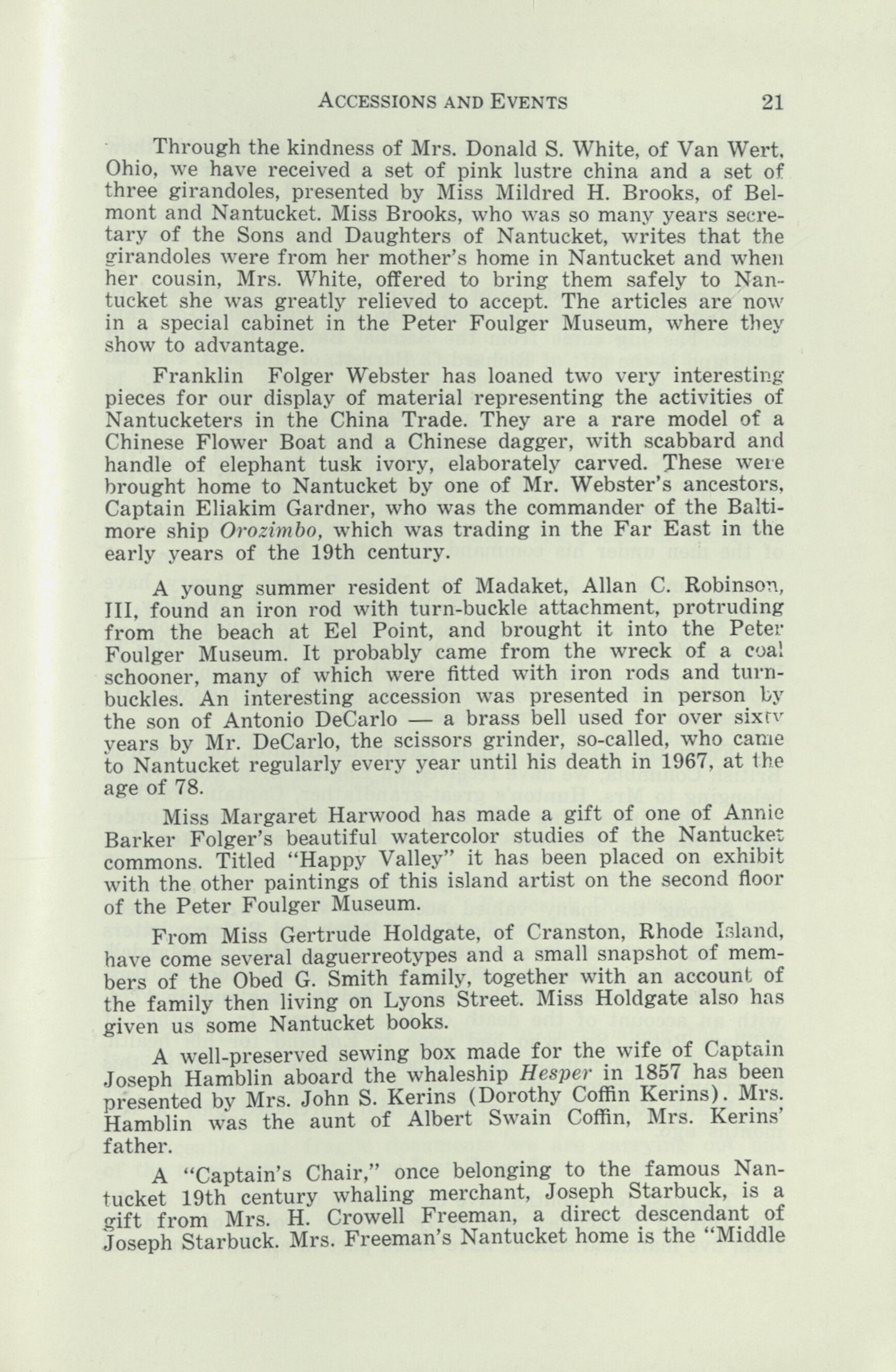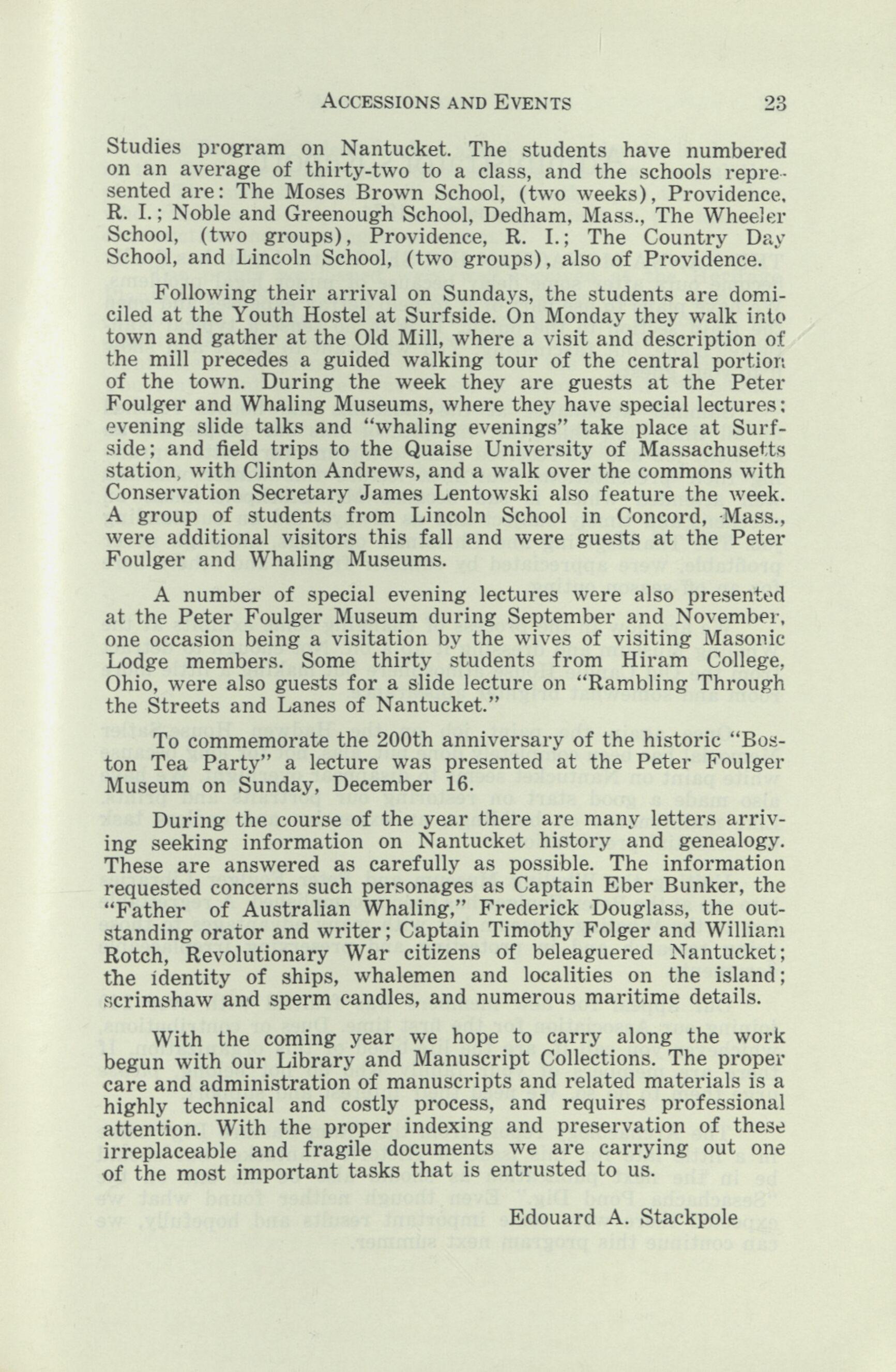
8 minute read
Accessions and Events
OUR ASSOCIATION has been fortunate in the quality of recent accessions. It is with considerable pleasure that it may be reported that we have acquired three logbooks for inclusion with our collection, now in the vault at the Peter Foulger Museum. First, by purchase, we have acquired the logbook of the ship Washington, of New Bedford, during a voyage from 1840 to 1844 under the command of Captain James G. Coffin, of Nantucket. This log has some excellent colored drawings, including one of the ship. From Gerard J. Coleman, of the Dana Hall Schools, in Wellesley, Mass., we have been presented the logbook of the ship Pocahontas, of Portsmouth, New Hampshire, one of the few whaleships from that State, which sailed in 1832 for the Pacific under Captain Thomas Barnard of Nantucket, and with Nantucket officers and boatsteerers.
From an anonymous donor we have received the logbook of the ship Constitution, of Nantucket, one of the Charles G. and Henry Coffin firm's ships, which sailed in 1835 for a three-year voyage to the Pacific Ocean, under Captain Edward Joy. This, also, has colored drawings, the most notable pages being of the ship flags from Nantucket, New Bedford and Fairhaven.
Mrs. Lewis Greenleaf, a member of our Association for many years, has presented a handsome china punch bowl bearing the double "F" of the Folger Family of Nantucket on one side and a Folger crest on the other. David Austin has given the Commercial Insurance Company of Nantucket's document in which Captain Obed Swain has insured his "Catchings" to be brought home on the ship Levi StarbucJc, Captain Jernegan, if the ship returned before October 12, 1857.
From Captain and Mrs. Reed Whitney, in Florida, we have received as a gift the original "Certificate of Purchase" handed Captain Irving Johnson when he acquired the brigantine Yankee at Southampton, England, in 1946. During her stay in Nantucket the Yankee was owned by Captain Whitney, and many appreciated the fact she was berthed here and wish she could be once again at her anchorage in our harbor instead of going to pieces on a reef in the Pacific.
An unusual engine has come to us through the interest of Mrs. John G. Taylor — a "hot air engine," which was used on Tuckernuck Island by Mr. Bigelow to pump water. Walter Barrett, through whose efforts it was transported here, states the engine was once used at the Life Saving Station during the period the Station was on Tuckernuck. Kenneth Eldredge, of 'Sconset, has brought in a soapstone mold for casting lead bluefish drails. together with one of the drails used off the east end.
Through the kindness of Mrs. Donald S. White, of Van Wert, Ohio, we have received a set of pink lustre china and a set of three girandoles, presented by Miss Mildred H. Brooks, of Belmont and Nantucket. Miss Brooks, who was so many years secretary of the Sons and Daughters of Nantucket, writes that the girandoles were from her mother's home in Nantucket and when her cousin, Mrs. White, offered to bring them safely to Nantucket she was greatly relieved to accept. The articles are now in a special cabinet in the Peter Foulger Museum, where they show to advantage.
Franklin Folger Webster has loaned two very interesting pieces for our display of material representing the activities of Nantucketers in the China Trade. They are a rare model of a Chinese Flower Boat and a Chinese dagger, with scabbard and handle of elephant tusk ivory, elaborately carved. These were brought home to Nantucket by one of Mr. Webster's ancestors, Captain Eliakim Gardner, who was the commander of the Baltimore ship Orozimbo, which was trading in the Far East in the early years of the 19th century.
A young summer resident of Madaket, Allan C. Robinson, III, found an iron rod with turn-buckle attachment, protruding from the beach at Eel Point, and brought it into the Peter Foulger Museum. It probably came from the wreck of a coal schooner, many of which were fitted with iron rods and turnbuckles. An interesting accession was presented in person by the son of Antonio DeCarlo — a brass bell used for over sixrv years by Mr. DeCarlo, the scissors grinder, so-called, who came to Nantucket regularly every year until his death in 1967, at the age of 78. Miss Margaret Harwood has made a gift of one of Annie Barker Folger's beautiful watercolor studies of the Nantucket commons. Titled "Happy Valley" it has been placed on exhibit with the other paintings of this island artist on the second floor of the Peter Foulger Museum.
From Miss Gertrude Holdgate, of Cranston, Rhode Island, have come several daguerreotypes and a small snapshot of members of the Obed G. Smith family, together with an account of the family then living on Lyons Street. Miss Holdgate also has given us some Nantucket books.
A well-preserved sewing box made for the wife of Captain Joseph Hamblin aboard the whaleship Hesper in 1857 has been presented by Mrs. John S. Kerins (Dorothy Coffin Keiins). Mis. Hamblin was the aunt of Albert Swain Coffin, Mrs. Kerins' father.
A "Captain's Chair," once belonging to the famous Nantucket 19th century whaling merchant, Joseph Starbuck, is a <nft from Mrs. H. Crowell Freeman, a direct descendant of Joseph Starbuck. Mrs. Freeman's Nantucket home is the "Middle

22
HISTORIC NANTUCKET
Brick," on Main Street, built for her great-grandfather, Matthew Starbuck. Paul Blaekmur, of Cohasset, Mass., a Bunker descendant, has given us an unusual patchwork quilt made by Lydia Wood Bunker in 1861 on Nantucket, and her associates. Each of the cloth sections bears the name of the lady who worked on the quilt.
Through the kindness of Walter Barrett we have received an old stone jug once used aboard the ship Ploughboy, of Nantucket. The jug came from the Samuel Barrett house on Cliff Road and is the gift of Richard C. Barrett, of Gulfport, Florida.
Edgar Lindstrom has presented an interesting relic of World War I. It is a dress sword, a presentation to Lieutenant Thomas J. Prindiville, USNR, the commanding officer of the Nantucket Section of Naval Reserves during the war. The sword bears the inscription: "To Lieut. Thomas J. Prindiville, USNR, from the men of the Nantucket Section, Second Naval District, in appreciation of his kind and generous efforts to promote the welfare of the men under his command. Christmas, 1917."
A number of books for the Peter Foulger Library have been given by John J. Cisco, of 'Sconset. Mr. P. L. Winslow, of Lake San Marcos, California, has sent to us two valued books — Force and Nature: Attraction and Repulsion, by Dr. Charles F. Winslow, that remarkable Nantucket physician-scientist, and Light: Its Influence on Life and Health, by Forbes Winslow, M.D., a presentation gift to Dr. Charles F. Winslow.
From the estate of Annie Lawrence Hunton, of Victoria, British Columbia, we have received an English silver case watch, belonging to Mrs. Hunton's great-grandfather, Captain Matthew Clark. This interesting old timepiece is still in running order and within the case bears the name of its London maker, Jas. Thomas.

Among the many valued accessions which we have been fortunate to receive is a collection of Rotch and Rodman letters which have come from a descendant — Mrs. Mary H. Mandell, of Barnstable, a daughter of the late Rev. Alfred Rodman Hussey. In this collection is a letter from Bristol, England, in 1774, with an account of the death of Joseph Rotch, Jr., brother of William Rotch, Sr., who had gone to England for his health. Letters from Nantucket and Philadelphia are included in this important collection, which makes a handsome counterpart for the Frank Rotch letters and material purchased only a few months ago.
The past few months have been active ones for your historian. During September and early October groups of students from five mainland schools have taken part in an Environmental
Studies program on Nantucket. The students have numbered on an average of thirty-two to a class, and the schools represented are: The Moses Brown School, (two weeks), Providence, R. I.; Noble and Greenough School, Dedham, Mass., The Wheeler School, (two groups), Providence, R. I.; The Country Day School, and Lincoln School, (two groups), also of Providence.
Following their arrival on Sundays, the students are domiciled at the Youth Hostel at Surf side. On Monday they walk into town and gather at the Old Mill, where a visit and description of the mill precedes a guided walking tour of the central portion of the town. During the week they are guests at the Peter Foulger and Whaling Museums, where they have special lectures: evening slide talks and "whaling evenings" take place at Surfside; and field trips to the Quaise University of Massachusetts station, with Clinton Andrews, and a walk over the commons with Conservation Secretary James Lentowski also feature the week. A group of students from Lincoln School in Concord, Mass., were additional visitors this fall and were guests at the Peter Foulger and Whaling Museums.
A number of special evening lectures were also presented at the Peter Foulger Museum during September and November, one occasion being a visitation by the wives of visiting Masonic Lodge members. Some thirty students from Hiram College, Ohio, were also guests for a slide lecture on "Rambling Through the Streets and Lanes of Nantucket."
To commemorate the 200th anniversary of the historic "Boston Tea Party" a lecture was presented at the Peter Foulger Museum on Sunday, December 16.
During the course of the year there are many letters arriving seeking information on Nantucket history and genealogy. These are answered as carefully as possible. The information requested concerns such personages as Captain Eber Bunker, the "Father of Australian Whaling," Frederick Douglass, the outstanding orator and writer; Captain Timothy Folger and William Rotch, Revolutionary War citizens of beleaguered Nantucket; the identity of ships, whalemen and localities on the island; scrimshaw and sperm candles, and numerous maritime details.
With the coming year we hope to carry along the work begun with our Library and Manuscript Collections. The proper care and administration of manuscripts and related materials is a highly technical and costly process, and requires professional attention. With the proper indexing and preservation of these irreplaceable and fragile documents we are carrying out one of the most important tasks that is entrusted to us.

Edouard A. Stackpole









